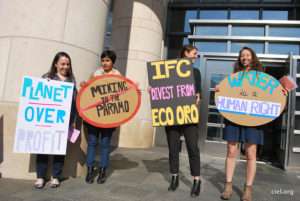FOR IMMEDIATE RELEASE
November 2, 2016
The World Bank invests in the corporate extortion of Colombia, jeopardizing the water supply for millions.
This was the message from concerned citizens as they gathered in simultaneous protests in Washington, DC and Bogotá, Colombia outside the International Finance Corporation (IFC). View photos here.
The IFC, the private lending arm of the World Bank, holds shares in Canadian mining company Eco Oro Minerals Corp. The company’s sole asset is a mining concession in one of Colombia’s high altitude wetlands, or páramos, which provides fresh water for millions of Colombians. When Colombia’s highest court affirmed that mining in the páramos is illegal, Eco Oro announced it would sue the country using investor-state dispute settlement.
 Today’s protest occurs on the eve of Thursday’s shareholder vote, in which the company seeks funding for its investor-state arbitration against Colombia. “By continuing to invest in Eco Oro, the IFC is funding a lawsuit that seeks to undermine Colombia’s sovereign right to protect water and regulate in the public interest,” says Carla Garcia Zendejas of the Center for International Environmental Law. “How can this possibly align with its mission to fight poverty?”
Today’s protest occurs on the eve of Thursday’s shareholder vote, in which the company seeks funding for its investor-state arbitration against Colombia. “By continuing to invest in Eco Oro, the IFC is funding a lawsuit that seeks to undermine Colombia’s sovereign right to protect water and regulate in the public interest,” says Carla Garcia Zendejas of the Center for International Environmental Law. “How can this possibly align with its mission to fight poverty?”
This is only the latest of many actions in opposition to the mine and IFC’s investment. Tens of thousands have taken to the streets in Colombia, and just last week, representatives from the Committee for the Defense of Water and the Santurbán Páramo, AIDA, and CIEL delivered a petition to the IFC signed by thousands of people calling for the IFC to divest.
Páramos are crucial for the generation and conservation of potable water for Colombian citizens. The network of páramos that runs through the Colombian Andes provides water for over 70% of the population. The páramos are also a major carbon sink and one of most important ecosystems to combat climate change. If this project were allowed to go forward, almost 3 million people could be impacted by Eco Oro’s mining activity in the Santurbán páramo.
“The páramos have been called the lungs of the earth,” said Alix Mancilla, an active participant in the Committee, in Santurbán, a diverse civic coalition composed of 40 groups that oppose the mining project. “To operate the mine, the company would use huge amounts of cyanide and explosives. We cannot have mining and protect our water supply at the same time. We say no to gold, yes to water.”
In August 2016, the IFC’s compliance office found the project hadn’t met the IFC’s own performance standards. Eco Oro’s shares have been falling steadily and earlier this year the company announced its intention to sue the government of Colombia.
“At this point, the IFC is invested in a company whose value rests on winning litigation against Colombia, litigation that will likely cost millions in tax dollars. The IFC should not be betting against Colombia’s efforts to enforce its laws and protect its water,” adds Garcia.
Contacts:
Carla Garcia Zendejas, CIEL Program Director, [email protected], 202.742.5846
